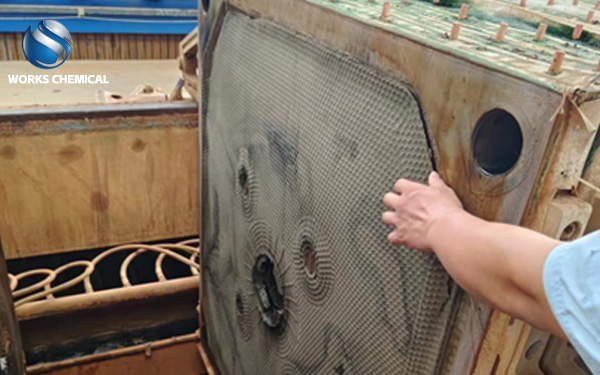
To reduce the operating costs of sludge pressing by plate and frame filter presses, efforts can be made in aspects such as equipment maintenance, chemical agent usage, operation optimization, and energy consumption management. The following are specific measures and analyses:

I. Equipment Maintenance and Consumables Management
Hydraulic oil management
Anti-pollution: Close the oil filling valve of the hydraulic system to reduce the entry of dust in the air and lower the frequency of hydraulic oil replacement.
Leakage prevention: Regularly inspect the sealing ring. If any leakage is found, repair it promptly to avoid increased maintenance costs caused by leakage.
Cost-effectiveness: Hydraulic oil contamination or leakage can cause equipment damage, and the maintenance cost is high. Therefore, daily maintenance needs to be strengthened.
Filter cloth maintenance
Regular cleaning: Clean the filter cloth after each use to prevent sludge from adhering and causing clogging or damage to the filter cloth.
Avoid sharp objects: Prevent the filter cloth from being scratched by sharp objects to extend its service life.
Cost-effectiveness: Filter cloth is a consumable. Regular maintenance can reduce the frequency of replacement and lower the cost of consumables.
Filter plate maintenance
Pressure control: To prevent excessive pressure from damaging the filter plates, the pressure should be adjusted to an appropriate state during operation.
Regular inspection: When abnormal solids are found at the edge of the filter plate, they should be cleaned up in time to prevent damage to the filter plate.
Cost-effectiveness: The filter plates are relatively expensive, and the cost of replacing them after damage is high. Therefore, enhanced maintenance is required.
Ii. Optimization of Chemical Agent Usage
Select an efficient and suitable sludge conditioner
Effect improvement: The use of high-efficiency sludge conditioning agents can reduce the moisture content of sludge and enhance the efficiency of plate and frame filter presses.
Case Analysis: After a certain printing and dyeing factory adopted Shijun sludge efficiency enhancer, the sludge pressing efficiency increased by four times, and the sludge moisture content dropped from 60% to 38.2%, significantly reducing the sludge disposal cost.
Cost-effectiveness: Although the unit price of the high-efficiency sludge conditioner is relatively high, it can reduce the dosage of chemicals and the amount of sludge to be disposed of, resulting in a lower overall cost.
Reduce the waste of chemicals
Precise dosing: Dynamically adjust the dosage of chemicals based on the nature of the sludge to avoid excessive use.
Cost-effectiveness: Reducing the waste of chemicals can lower the cost of chemicals and simultaneously enhance the treatment effect.
Iii. Operation Optimization
Avoid overloading operation
Operate according to parameters: Run strictly in accordance with the equipment parameter Settings to avoid equipment failure caused by overload.
Cost-effectiveness: Overloading operation will increase the equipment failure rate, with high maintenance costs. Standardized operation is required.
Optimize the feeding and pressing parameters
Parameter adjustment: Adjust the feed pressure, pressing pressure and time according to the nature of the sludge to improve the treatment efficiency.
Cost-effectiveness: Optimizing parameters can shorten processing time, reduce energy consumption and labor costs.
Iv. Energy Consumption Management
Reduce energy waste
High-efficiency equipment: Select high-efficiency and energy-saving plate and frame filter presses to reduce power consumption.
Operation optimization: Reasonably arrange the operating time of the equipment to avoid no-load operation.
Cost-effectiveness: Reducing energy consumption can significantly lower operating costs.
V. Comprehensive Cost Comparison
Compared with the belt filter press
Operating cost: Although the belt filter press has a high degree of automation, the filter cloth needs to be replaced frequently, resulting in high maintenance costs. Although the plate and frame filter press has a high labor intensity, the sludge moisture content is low and the subsequent disposal cost is low.
Selection suggestion: Choose appropriate equipment based on the nature of the sludge and treatment requirements, and comprehensively assess the operating costs.
Compared with the centrifuge
Operating cost: The centrifuge has low chemical consumption and low operating expenses, but the equipment price is high. The plate and frame filter press equipment is low in price, but the labor cost is high.
Selection suggestion: For scenarios with small processing capacity and high requirements for moisture content, plate and frame filter presses have more advantages.